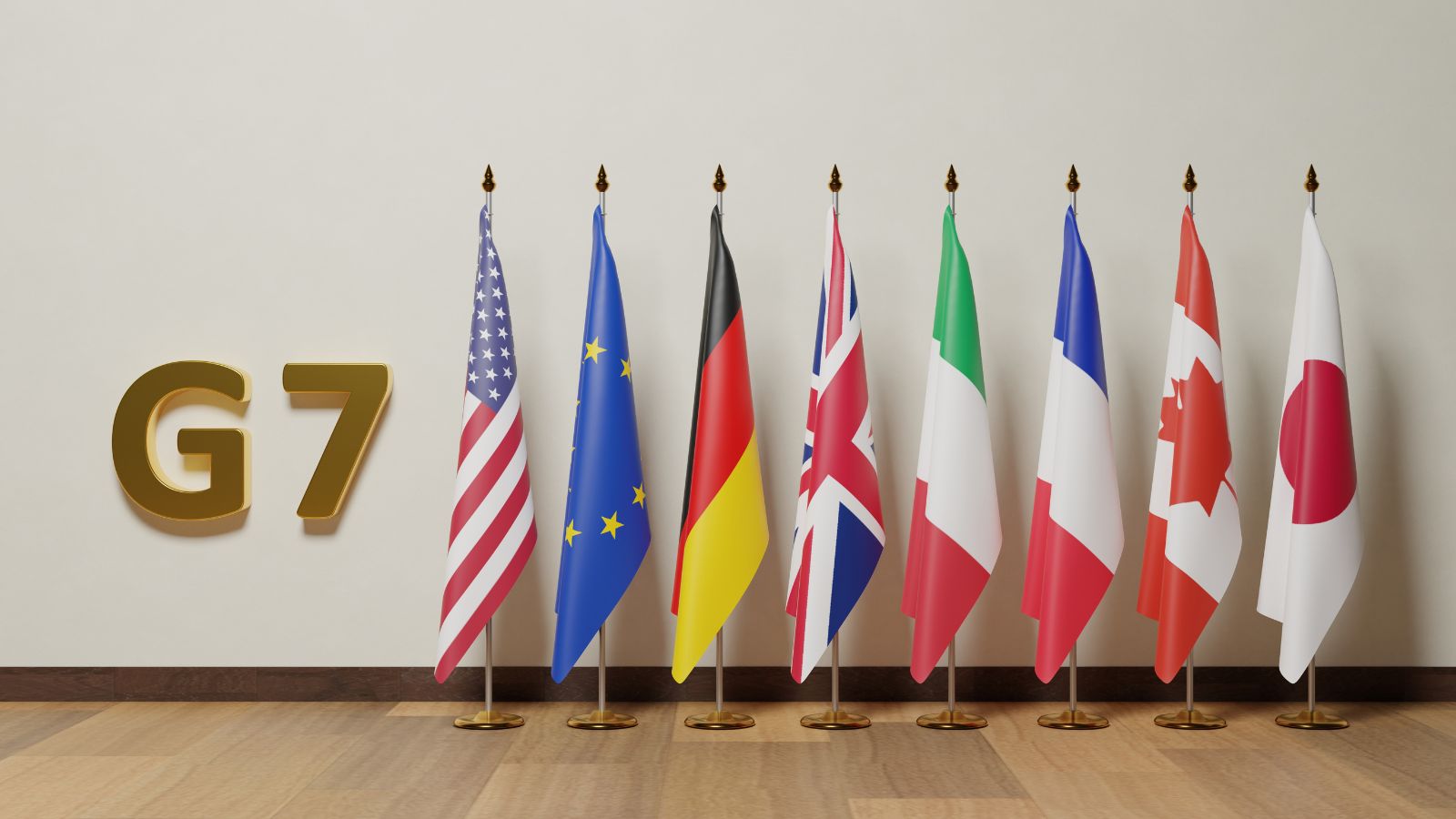From stable financial systems to leadership in clean technology and education, Canada continues to build strength across sectors without drawing loud attention. It competes with global powers not by scale but through reliability, innovation, and smart policy. Whether it’s expanding trade networks, investing in infrastructure, or shaping global standards, Canada’s role in the world economy is becoming harder to ignore. In this blog, we will look at 23 signs that show how Canada is quietly dominating the global economy.
Strong Banking System Stability

Canada’s banking system is known for its reliability and conservative practices. The country’s major financial institutions operate under strict regulations and maintain a reputation for being well-managed. This framework has allowed Canadian banks to avoid excessive risk and remain stable during times of global financial disruption. The sector’s consistency builds trust among international investors and consumers alike. Canada’s banks also play an active role beyond national borders through international branches and partnerships. Their stability supports economic growth at home while contributing to Canada’s global financial reputation.
Robust GDP Growth Amid Global Uncertainty

Canada continues to maintain economic momentum even as many global economies face challenges. Its diverse economy is supported by sectors such as natural resources, technology, manufacturing, and services. This variety allows Canada to weather disruptions in any single industry. Consumer demand, population growth, and ongoing infrastructure investments also support economic activity across the country. While other economies slow down or contract, Canada’s steady growth reflects a strong internal market and sound policy environment. This consistent performance draws attention from global investors and signals a stable environment for business.
Rising Global Demand for Canadian Energy

Canada remains one of the world’s leading energy producers and exporters. Its abundant natural resources, including oil, natural gas, and hydroelectric power, are critical to global supply chains. As countries look for reliable and politically stable sources of energy, Canada stands out as a preferred partner. The country’s commitment to environmental standards also enhances its reputation among energy importers. Ongoing investments in transportation infrastructure and pipeline capacity support growing exports. With demand increasing, especially from Asia and Europe, Canada’s energy sector continues to expand its global reach.
Leadership in Clean Tech Innovation

Canada is becoming a global leader in clean technology through investment, research, and early adoption. Its companies are advancing solutions in carbon capture, renewable energy, and energy efficiency. Government programs provide funding and support for startups and established firms in the sector. Universities and research institutions contribute to innovation and partnerships that bring new technologies to market. Canada’s commitment to emission reductions and climate goals creates a strong domestic market for clean tech. As the demand for clean energy rises worldwide, Canada’s role as an innovator strengthens its position in the future economy.
Top Global Ranking in Education Outcomes

Canada’s education system is widely respected for its quality, accessibility, and outcomes. Students perform well across subjects, and international assessments often place Canada ahead of many developed nations. Public investment in education ensures high standards from primary to post-secondary levels. The country is also known for its strong university system, which attracts international students and researchers. These institutions play a key role in innovation, workforce development, and global academic influence. A well-educated population supports economic competitiveness and social mobility.
Thriving AI and Tech Ecosystem

Canada has become a significant hub for artificial intelligence and technology development. Cities like Toronto, Montreal, and Vancouver are home to leading research labs, global tech companies, and top-tier universities. Government support combined with strong academic talent has created an environment where startups and large firms can grow. Canada attracts international investment in areas such as machine learning, quantum computing, and health tech. The country’s tech workforce continues to expand with new training programs and immigration policies that bring in global talent.
Trade Agreements That Open New Markets

Canada has signed several major trade agreements that give its businesses access to a wide range of international markets. Agreements such as CETA, CPTPP, and USMCA reduce trade barriers and create stable frameworks for export growth. These deals support Canadian industries by opening new opportunities in sectors like agriculture, manufacturing, and services. They also protect investments and intellectual property while promoting fair competition. Canadian companies benefit from reduced tariffs and streamlined regulations.
Low Public Debt Relative to G7 Peers

Canada maintains a relatively modest level of public debt compared to other G7 countries. This provides the government with greater flexibility to invest in critical areas such as healthcare infrastructure and innovation. Strong fiscal management allows Canada to respond effectively to economic shifts without taking on excessive risk. Investors see this stability as a sign of responsible governance, which in turn attracts more capital. Low debt levels also reduce long-term financial pressure and support credit ratings. This advantage helps Canada maintain confidence in its economy while building a foundation for sustainable growth over time.
Global Talent Attraction and Retention

Canada is recognized as one of the most welcoming countries for skilled professionals. Its immigration policies prioritize education, work experience, and industry demand, which helps attract qualified individuals from around the world. Major cities offer a high quality of life, cultural diversity, and strong job markets, making it easier for newcomers to settle and contribute. Universities and employers actively support international talent through research opportunities and career pathways. These efforts help address labour shortages and strengthen innovation.
Rising Influence in Global Mining Markets

Canada holds a central position in the global mining industry thanks to its vast mineral reserves and advanced extraction technologies. It is a major producer of key resources, including gold, nickel, copper, and potash. Canadian mining companies operate across several continents and are known for responsible practices and technical expertise. The Toronto Stock Exchange is a leading hub for mining finance, which attracts global investment. As demand increases for minerals used in clean energy and digital technologies, Canada’s role in global supply chains continues to grow.
Strategic Investments in Infrastructure

Canada continues to invest in transportation, digital networks, housing, and public utilities to support long-term economic growth. Federal and provincial programs fund major projects that improve efficiency, reduce bottlenecks, and expand capacity. These developments connect communities, improve trade corridors, and support business operations. Urban centres are expanding transit systems while rural areas gain access to broadband and clean water. Infrastructure upgrades also create skilled jobs and attract private investment. By modernizing critical systems and planning for future needs, Canada strengthens its domestic economy and is a destination for global trade and innovation.
Consistent Current Account Surpluses

Canada has maintained steady performance in its current account through a mix of goods, exports, services, and investment income. Strong global demand for natural resources, combined with a growing services sector, supports positive trade flows. The country also benefits from income earned on foreign investments held by Canadian entities. While some fluctuations occur due to global market changes, Canada often returns to surplus, driven by stable export volumes and competitive pricing. This balance reflects economic strength and reduces reliance on external borrowing.
Resilience in Real Estate and Construction

Despite economic pressures and shifting interest rates, Canada’s real estate and construction sectors continue to show stability. Residential and commercial development remains active, especially in high-demand regions. Urban population growth and immigration contribute to housing needs, which sustain building activity. Government programs support infrastructure and public housing investments across the country. The construction industry also adapts quickly to material costs and labour availability with innovations in project management and design. This resilience contributes to employment, economic output, and supply chain activity.
High Productivity in Agriculture Exports

Canada’s agriculture sector is a leading global exporter known for quality, safety, and innovation. Producers use advanced technologies, including precision farming automation and climate-resilient practices, to increase efficiency. Key exports include wheat, canola, pulses, dairy, and meat products, all of which meet high standards demanded by international buyers. Strong supply chain infrastructure supports rapid movement from farm to port. Research institutions and producer groups work together to improve yields and sustainability. These efforts allow Canadian agriculture to meet global demand and compete effectively.
Growing Footprint in Financial Services Abroad

Canadian financial institutions are expanding their presence in global markets through strategic acquisitions, partnerships, and diversified services. Major banks and insurance firms operate across North America, Europe, Asia, and the Caribbean, offering retail, corporate, and investment products. Their international growth is supported by a strong regulatory foundation at home and a focus on digital transformation. These firms provide financial stability and expertise in emerging and developed markets. By growing their global footprint, Canadian institutions enhance the country’s economic influence and gain access to new revenue streams.
Expanding Aerospace and Aviation Sector

Canada has a well-established aerospace and aviation industry supported by skilled labour, world-class manufacturers, and strong government backing. The sector includes commercial aircraft, production, space technology, and maintenance services. Companies like Bombardier and CAE have built reputations for excellence and innovation in global markets. Research centres and universities contribute engineering talent and technical training. Canada’s airports and air navigation systems are also recognized for quality and efficiency. The country exports aerospace products to multiple continents while investing in next-generation aircraft and sustainable aviation technology.
Low Corporate Tax Rates Compared Globally

Canada maintains a competitive corporate tax environment that appeals to businesses looking to invest or expand. Its combined federal and provincial rates are lower than those in many other G7 nations, making it attractive for both domestic companies and multinational firms. The tax system also includes incentives for innovation, job creation, and capital investment. This approach encourages entrepreneurship and supports sectors such as technology, manufacturing, and clean energy. By keeping rates moderate and rules transparent, Canada fosters a stable business climate.
Strong Pension Funds Investing Worldwide

Canada’s public and private pension funds are among the most active and respected institutional investors globally. Funds like the Canada Pension Plan Investment Board and Ontario Teachers’ Pension Plan manage diversified portfolios that include real estate, infrastructure, private equity, and public markets. These investments span across continents and industries, reflecting sophisticated risk management and long-term strategy. The scale and performance of Canadian pension funds provide steady returns for beneficiaries while supporting global economic growth. Their presence in international markets also enhances Canada’s influence in financial decision-making.
Cultural Exports Gaining Global Reach

Canada’s cultural industries, including film, music, literature, and digital media, are making a growing impact around the world. Artists, filmmakers, and creators regularly achieve international success while representing Canada’s diverse voices. Government programs support creative industries through funding, training, and global promotion. Canadian production studios and streaming content have gained strong viewership in key global markets. Music festivals and literary events further boost recognition of Canadian talent. Cultural exports not only contribute to economic growth but also strengthen Canada’s global identity.
Stable Political Climate Supporting Investment

Canada’s political system is widely regarded as transparent, predictable, stable, and democratic, which helps maintain a stable investment environment. Clear legal frameworks and reliable public institutions support business confidence and long-term planning. Investors value the country’s policy consistency across leadership changes. Open engagement between government, industry, and civil society contributes to balanced decision-making. This environment reduces uncertainty and encourages both domestic and foreign investment. Political stability also allows Canada to take leadership roles in international forums and trade negotiations.
Canadian Firms Acquiring Global Brands

Canadian companies continue to expand their global presence by acquiring established international brands across multiple sectors. These acquisitions help firms gain market share, enhance product offerings, and access new customer bases. Businesses in finance, food retail, and technology have successfully executed cross-border deals that raise their global profile. The ability to integrate and manage international operations reflects Canada’s strong corporate governance and strategic planning capabilities. These moves also bring innovation and skills back to the domestic economy.
Increasing Role in Global Policy Discussions

Canada is playing an increasingly active role in shaping international policy on issues such as climate change, trade, health, and digital governance. It contributes to multilateral institutions and often acts as a bridge between developed and developing nations. Canadian diplomats, experts, and leaders participate in global negotiations that influence economic and social standards. The country’s emphasis on inclusive policy, human rights, and sustainability adds weight to its voice in global forums. By promoting balanced and evidence-based approaches, Canada helps shape outcomes that align with shared interests.
Leadership in ESG and Sustainable Finance

Canada is emerging as a leader in environmental, social, and governance standards and sustainable finance practices. Financial institutions, investors, and regulators are actively integrating ESG considerations into risk assessment and investment strategies. Canadian stock exchanges promote ESG disclosure while pension funds adopt long-term sustainability goals. Governments support green bond frameworks and sustainable project financing. These efforts align the financial sector with broader climate and social objectives. Canada’s approach balances financial performance with responsible practices, making it a model for others.
21 Products Canadians Should Stockpile Before Tariffs Hit

If trade tensions escalate between Canada and the U.S., everyday essentials can suddenly disappear or skyrocket in price. Products like pantry basics and tech must-haves that depend on are deeply tied to cross-border supply chains and are likely to face various kinds of disruptions
21 Products Canadians Should Stockpile Before Tariffs Hit
